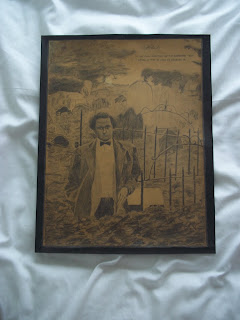
The road there is uphill
And, carrying our bag of hardy plants,
We pass on one side a new estate and supermarket
And, on the other, anachronistic, dying allotments.
We enter through the old quarter,
Where solemn municipal symmetry
Has slipped into a kind of natural sprawl,
Like a larger version of an old village churchyard.
Grey squirrels dart amidst shadows and weeds
And blurred gravestones that sink and tilt
Like rocks beneath the birdsung trees.
As we wander the sun-dappled avenues,
We glance at dedications with spaces left
For late arrivals on family masonry,
And glimpse ourselves momentarily reflected
In the sleek, flashing bodywork and glass
Of a black limousine that hums past,
Towards the Chapel, at the heart of the cemetery.
By the Garden and Book of Remembrance
With its pages turned to mark the passing of days;
By plots housing the gated mansions of the rich,
Statued with seraphs and Redeemers and Madonnas –
No less vulgar and no less sincere
Than the boxwood crosses of the poor –
We reach the claustrophobic terraces
Which mark the streets of the recently cremated.
Conscientious generations of mourners
Have made these narrow walks of marble resplendent,
And we place our little pots and bunches of brief colour
Where we should, then add our own few minutes
Of living silence to the endless quietus of loss.
The way back home is downhill
And the traffic always strikes so loud,
Deafening, or perhaps reminding us
Of the hard truth, that all roads will lead us
Back, in time, to this last home on the hill.
(2001)
I’ve always liked graveyards, be they large or small, urban or rural. These days, when I visit the section of the cemetery where my mum’s headstone stands, the memento mori aspect intensifies every time, because the ‘claustrophobic terraces’ of what amounted to a small town back in 1996 when Mum died, have now, of course, multiplied and resemble a veritable necropolis.
I borrowed the title, by the way, from one of Dylan Thomas’s birthday poems, ‘Twenty-Four Years’:-
‘In the final direction of the elementary town,
I advance for as long as forever is.’
The picture is a sketch I did from a very eloquent photograph of DT which, I think, must have been taken towards the end of his short life. The cemetery may well be the one at Laugharne in Wales, where he’s buried. The sketch is dated 1976. I visited Laugharne about fifteen years later and had a wander around the graves. It was a lovely sun-dappled afternoon and I took some atmospheric pictures of DT’s simple white wooden cross and the town and the estuary – at least, I thought I did. It turned out that the camera had developed a fault, the whole film was over-exposed, and – in those pre-digital days – that was that. Maybe I’ll get back there one day and try again…

